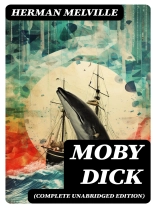Herman Melville’s *Moby Dick*, presented in this complete unabridged edition, is a masterful exploration of obsession, revenge, and the relationship between humanity and nature. Written in a rich, multifaceted prose style, it intricately weaves narrative, philosophical discourse, and vivid descriptions of whaling life. Set against the backdrop of the mid-19th century, the novel reflects the existential angst and burgeoning industrialism of the era, employing symbolism that transcends its surface tale of Captain Ahab’s relentless pursuit of the elusive white whale. The text invites readers to ponder profound themes of fate, free will, and the human condition, positioning itself as a cornerstone of American literature. Melville, a contemporary of Nathaniel Hawthorne, drew heavily from his own experiences as a sailor and his disillusionment with whaling culture, which informs the authenticity of the oceanic journey represented in *Moby Dick*. His encounters at sea and his astute observations of societal norms shaped his critical lens on man’s struggle against the unfathomable forces of nature and fate, lending depth to Ahab’s tragic quest. This complete edition is essential for both seasoned scholars and casual readers alike. It offers an unfiltered glimpse into Melville’s complex narrative style and philosophical inquiries, making it a vital contribution to the understanding of American literary heritage. Whether you seek adventure, profound insight, or literary beauty, *Moby Dick* promises to deliver a transformative experience.
Sobre el autor
Herman Melville (1819–1891) stands as one of the towering figures in American literature, embodying the quest for existential meaning deep within the human spirit. Born in New York City to an established merchant family, Melville’s early adventures at sea became seminal in shaping his literary voice. His experiences as a sailor provided the backdrop for his exploration of the tempestuous relationship between man and the natural world, most notably in his magnum opus, ‘Moby Dick (Complete Unabridged Edition)’. This epic novel, first published in 1851, weaves a complex narrative around Captain Ahab’s maniacal pursuit of the white whale, and is lauded for its profound psychological insights and its philosophical depth. Melville’s literary style is known for its elaborate symbolism, its narrative experimentation, and a propensity for delving into the darker recesses of the human condition. Though his work won little fame and fortune during his lifetime, it was posthumously recognized for its brilliance. Today, Melville’s ‘Moby Dick’ is considered a pinnacle of American Romanticism and a cornerstone of world literature. His authorial legacy is a testament to his enduring relevance as a reflective mirror into the soul of humanity.












